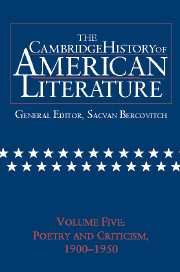Book contents
- Frontmatter
- Introduction
- MODERNIST LYRIC IN THE CULTURE OF CAPITAL
- POETRY IN THE MACHINE AGE
- Prologue
- 1 Gertrude Stein: the poet as master of repetition
- 2 William Carlos Williams: in search of a western dialect
- 3 H. D.: a poet between worlds
- 4 Marianne Moore: a voracity of contemplation
- 5 Hart Crane: tortured with history
- 6 Langston Hughes: the color of modernism
- LITERARY CRITICISM
- Chronology 1910–1950
- Bibliography
- Index
2 - William Carlos Williams: in search of a western dialect
from POETRY IN THE MACHINE AGE
Published online by Cambridge University Press: 28 March 2008
- Frontmatter
- Introduction
- MODERNIST LYRIC IN THE CULTURE OF CAPITAL
- POETRY IN THE MACHINE AGE
- Prologue
- 1 Gertrude Stein: the poet as master of repetition
- 2 William Carlos Williams: in search of a western dialect
- 3 H. D.: a poet between worlds
- 4 Marianne Moore: a voracity of contemplation
- 5 Hart Crane: tortured with history
- 6 Langston Hughes: the color of modernism
- LITERARY CRITICISM
- Chronology 1910–1950
- Bibliography
- Index
Summary
Chapter 25 of The Autobiography (1951) of William Carlos Williams (1883–1963) begins with the following startling remarks about the first two decades of the twentieth century:
These were the years just before the great catastrophe of our letters – the appearance of T. S. Eliot's The Waste Land. There was heat in us, a core and a drive that was gathering headway upon the theme of discovery of a primary impetus, the elementary principle of all art, in the local conditions. Our work staggered to a halt for a moment under the blast of Eliot's genius which gave the poem back to academics. We did not know how to answer him.
Later in the book Williams elaborates on this topic in more detail. According to him, during the first two decades of the century young American poets just starting their careers, Williams foremost among them, were experiencing an exhilarating excitement about reinventing art and poetry in America to which the publications of The Waste Land (1922) somehow put an end. Evidently, one gathers, after Eliot's classical, erudite, and cosmopolitan gesture, the other young American poets, whose conception of American poetry claimed to have everything to do with a primary understanding of the elemental locality of America as a new nation, did not know what to do about inaugurating a “new order.” Even Marianne Moore, one of the poets whom Williams believed to be in the right direction (we might call it the “nativist” or “vernacular” direction), was “no luckier” than all the others.
- Type
- Chapter
- Information
- The Cambridge History of American Literature , pp. 217 - 238Publisher: Cambridge University PressPrint publication year: 2003



